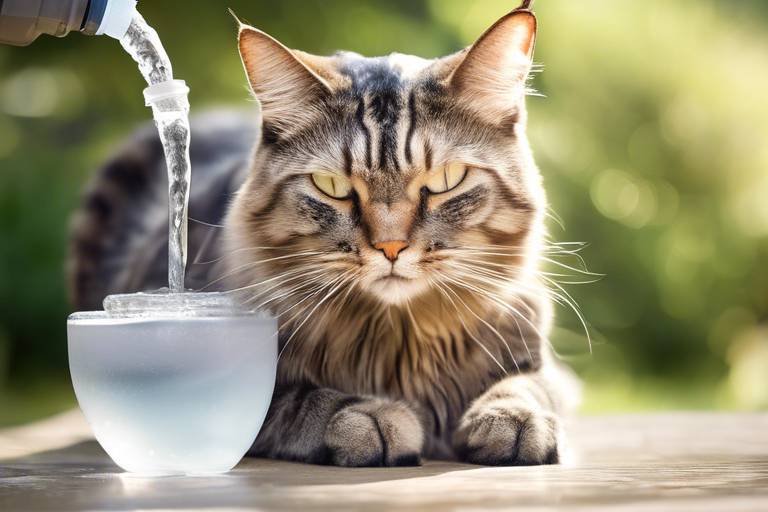How to Recognize and Treat Ear Infections in Older Pets
This article provides essential insights into identifying and managing ear infections in senior pets, emphasizing the importance of early detection and appropriate treatment for their overall health and well-being.
Ear infections in older pets can stem from various causes, including allergies, ear mites, and even underlying health conditions. It's crucial to recognize the types and symptoms of ear infections to ensure effective treatment and prevention. Just like humans, our furry friends can suffer from discomfort that could lead to more serious health issues if left unchecked. Understanding the anatomy of their ears and the common issues they face can empower pet owners to act swiftly when needed.
Identifying the signs of ear infections is vital for timely intervention. Symptoms may include:
- Scratching: Your pet may scratch at their ears more frequently.
- Shaking of the head: This is a common reaction to irritation.
- Unusual odors: A foul smell coming from the ears can indicate an infection.
Older pets often exhibit behavioral changes when experiencing discomfort from ear infections. Increased irritability or withdrawal can be indicators that something is wrong. Just like us, pets can become moody or less social when they’re not feeling well. If your usually playful pup suddenly turns into a couch potato, it might be time to investigate further.
Pets may groom their ears excessively in response to irritation. This behavior can worsen the infection and lead to further complications if not addressed promptly. If you notice your pet spending an unusual amount of time cleaning their ears, it could be a red flag.
A pet suffering from an ear infection might show a decreased appetite. Understanding this symptom can help caregivers act swiftly to provide necessary care. If your furry friend is turning their nose up at their favorite treats, don’t ignore the signs!
A physical examination of a pet's ears can reveal critical signs of infection, including redness, swelling, and discharge. These symptoms require immediate attention, as they can lead to more severe health issues if left untreated. Regularly checking your pet's ears can help you catch these signs early.
Understanding the underlying causes of ear infections can aid in prevention and proper treatment. Common causes include:
- Allergies: Pets with allergies are more prone to ear infections.
- Foreign Bodies: Objects lodged in the ear can cause irritation and infection.
- Underlying Health Issues: Chronic health problems, such as diabetes, can predispose pets to ear infections.
Pets with allergies are more prone to ear infections. Identifying and managing these allergies can significantly reduce the frequency of infections. Think of allergies as a storm brewing; if not addressed, it can lead to a downpour of health issues.
Chronic health problems such as diabetes can predispose pets to ear infections. Regular veterinary check-ups can help monitor and manage these conditions effectively. Just like we need check-ups to keep our health in check, our pets do too!
Effective treatment of ear infections often involves a combination of medications and home care. Understanding available options can facilitate better health outcomes for older pets. It’s essential to tackle the problem from multiple angles to ensure your pet feels better as quickly as possible.
Seeking veterinary care is essential for diagnosing and treating ear infections. A vet can prescribe appropriate medications and recommend follow-up care. They have the expertise to pinpoint the issue and provide the right treatment plan tailored to your pet’s needs.
Some safe home remedies may alleviate minor symptoms, but they should not replace professional veterinary treatment. Always consult a vet before trying home solutions. Remember, what works for one pet may not work for another!
Preventing ear infections is often more effective than treatment. Regular cleaning and monitoring can help maintain ear health in older pets. Think of it as keeping your pet's ears in tip-top shape before problems arise.
Routine ear cleaning can prevent the buildup of debris and wax, reducing the risk of infections. Use vet-recommended products for safe cleaning. It’s like brushing your teeth; a little maintenance goes a long way!
A balanced diet and a healthy lifestyle can bolster a pet’s immune system, making them less susceptible to infections. Regular exercise and proper nutrition are key. Just as we thrive on a good diet, so do our beloved pets!
Knowing when to consult a veterinarian is crucial for managing ear infections effectively. Early intervention can prevent complications and ensure a quicker recovery. Don’t hesitate to reach out if you feel something is off with your pet.
If symptoms persist despite home care, it’s essential to seek veterinary assistance. Chronic infections can lead to more severe health issues if left untreated. Think of it like a small leak in your roof; if you ignore it, it could turn into a much bigger problem.
If a pet shows signs of severe discomfort or distress, immediate veterinary consultation is necessary to address potential complications from an ear infection. Your pet relies on you to recognize when they need help.
Recognizing and treating ear infections in older pets is vital for their quality of life. With proper awareness and care, pet owners can ensure their furry companions remain healthy and happy. Remember, you are your pet’s best advocate!
Q: How can I tell if my pet has an ear infection?
A: Look for symptoms like scratching, head shaking, and unusual odors from the ears.
Q: Can I treat my pet's ear infection at home?
A: While some home remedies may help, it's best to consult a veterinarian for proper diagnosis and treatment.
Q: How often should I clean my pet's ears?
A: Regular cleaning is recommended, but consult your vet for a cleaning schedule tailored to your pet's needs.

Understanding Ear Infections
Ear infections in older pets can be a common yet serious health concern that every pet owner should be aware of. These infections can arise from a variety of causes, making it essential to understand the underlying factors that contribute to their development. For instance, allergies are one of the leading culprits, often causing inflammation and irritation in the ear canal. Additionally, ear mites, which are tiny parasites, can also lead to infections, particularly in pets that spend time outdoors or in close contact with other animals.
When we talk about ear infections, it’s crucial to recognize that they can be classified into different types based on their location:
- Otitis Externa: This type affects the outer ear canal and is the most common form seen in pets.
- Otitis Media: This affects the middle ear and can lead to more severe complications.
- Otitis Interna: This is an infection of the inner ear and is less common but can have serious consequences.
Identifying the symptoms of ear infections early can significantly improve the chances of successful treatment. Symptoms may include scratching at the ears, shaking the head excessively, and even unusual odors coming from the ear. These signs are often accompanied by discomfort, which can lead to changes in your pet's behavior. For instance, a normally playful dog might become withdrawn or irritable, indicating that something is amiss.
Moreover, understanding the anatomy of your pet's ears can also aid in recognizing potential issues. The ear canal of pets is shaped differently from that of humans, being more vertical and L-shaped. This unique structure can trap moisture and debris, creating a perfect environment for bacteria and yeast to flourish. Therefore, maintaining ear hygiene is not just a good practice; it's a vital part of your pet's overall health.
In summary, being aware of the causes and symptoms of ear infections in older pets is essential for timely intervention. Regular check-ups with a veterinarian, coupled with attentive observation of your pet's behavior, can make a significant difference in preventing these infections from becoming a serious issue.

Common Symptoms to Look For
Identifying the signs of ear infections in older pets is absolutely vital for timely intervention and treatment. Just like humans, our furry companions can’t always express their discomfort verbally, so it’s up to us as pet owners to be vigilant. Some of the most common symptoms include scratching at the ears, shaking of the head, and even unusual odors emanating from the ears. These signs can indicate that your pet is suffering from an ear infection, and recognizing them early can make a significant difference in their health and comfort.
In addition to these obvious signs, you might notice some behavioral changes in your pet. For instance, older pets may become increasingly irritable or withdrawn when they’re not feeling well. It’s almost as if they’re trying to tell us something is wrong but can’t find the words. If your usually friendly dog suddenly avoids interacting or seems more agitated than normal, it could be a sign that they are in pain. Pay close attention to these behavioral cues, as they can be critical indicators of discomfort.
Another symptom that often goes unnoticed is excessive grooming of the ears. If you see your pet constantly licking or scratching their ears, it’s a clear sign that they are experiencing irritation. This behavior, while instinctual, can actually worsen the infection and lead to further complications if not addressed promptly. Think of it like a dog chasing its tail; they might be trying to solve a problem, but in reality, they could be making it worse!
Furthermore, a pet suffering from an ear infection might show a decreased appetite. If your furry friend usually devours their meals but suddenly loses interest, it’s essential to investigate further. Changes in appetite can indicate discomfort or pain, and understanding this symptom can help caregivers act swiftly to provide the necessary care. Just like us, pets can lose their appetite when they are not feeling well, so don’t ignore this important signal.
Finally, a physical examination of your pet’s ears can reveal critical signs of infection. Look for redness, swelling, and any discharge that may be present. These physical manifestations require immediate attention and should not be overlooked. If you see any of these signs, it’s time to take action and consult your veterinarian. Remember, early detection is key to effective treatment!
To summarize, being aware of these symptoms can help ensure your older pet remains healthy and comfortable. By keeping an eye out for behavioral changes, excessive grooming, changes in appetite, and physical signs like redness or discharge, you can be proactive in managing your pet’s ear health.
- What should I do if I suspect my pet has an ear infection?
If you suspect your pet has an ear infection, it's crucial to consult your veterinarian for a proper diagnosis and treatment plan.
- Can I treat my pet's ear infection at home?
While some home remedies may alleviate minor symptoms, they should not replace professional veterinary treatment. Always consult your vet before trying home solutions.
- How can I prevent ear infections in my older pet?
Regular ear cleaning, a healthy diet, and routine veterinary check-ups can help prevent ear infections in older pets.
Behavioral Changes
When it comes to our beloved older pets, noticing any can be a significant indicator of underlying issues, such as ear infections. Pets, much like humans, communicate through their actions, and changes in behavior can often signal discomfort or pain. For instance, if your furry friend who once loved to play fetch suddenly becomes withdrawn or irritable, it could be a cry for help. It's essential to pay close attention to these behavioral shifts, as they can guide you toward identifying potential health problems.
Some common behavioral changes that may arise when a pet is suffering from an ear infection include:
- Increased Irritability: You might notice your pet being more snappy or grumpy than usual. This irritability can stem from the discomfort caused by the infection.
- Withdrawal: If your pet is usually social and suddenly prefers to isolate itself, this could indicate that they are feeling unwell. They may avoid interaction, which is not typical of their usual behavior.
- Restlessness: An infected ear may cause discomfort that leads to restlessness. Your pet might pace around or seem unable to settle down, which can be distressing for both the animal and its owner.
Understanding these behavioral changes is crucial for pet owners. They serve as vital clues in recognizing when something is off. If you observe any of these signs, it’s important to take action quickly. Ignoring these changes can lead to more severe health issues down the line. Remember, our pets rely on us to notice when they’re not feeling their best, and being proactive can make all the difference in their well-being.
In conclusion, being attuned to your pet's behavioral changes can be a game-changer. Just like a detective piecing together clues, you can help ensure your furry friend gets the care they need by recognizing these subtle signs of discomfort. After all, a happy pet means a happy home!
- What are the early signs of an ear infection in pets?
Early signs include scratching at the ears, shaking their head, and unusual odors coming from the ear canal. - Can I treat my pet's ear infection at home?
While some minor symptoms can be alleviated with home remedies, it’s crucial to consult a veterinarian for proper diagnosis and treatment. - How can I prevent ear infections in my older pet?
Regular ear cleaning and maintaining a healthy diet can significantly reduce the risk of ear infections. - When should I take my pet to the vet?
If you notice persistent symptoms or signs of severe discomfort, it’s essential to seek veterinary help immediately.
Excessive Grooming
When it comes to our beloved furry friends, can be a telltale sign that something is amiss, especially in older pets. If you notice your pet spending an unusual amount of time scratching or licking their ears, it’s crucial to pay attention. This behavior often stems from irritation caused by an ear infection, which can lead to a vicious cycle of discomfort. The more they groom, the more irritated their ears can become, leading to further complications. Think of it like a dog chasing its tail; the more they try to fix the problem, the worse it gets.
But why do pets resort to excessive grooming? It’s their way of coping with discomfort. Imagine having an itch that just won’t go away; you’d do everything in your power to relieve that sensation! For pets, this might mean constant scratching, shaking their heads, or even rubbing their ears against furniture. This behavior can lead to skin irritation and even open wounds, which can exacerbate the initial issue. It's like trying to patch a leak with a band-aid; it may help temporarily, but it won’t solve the underlying problem.
As a pet owner, you can help break this cycle by closely monitoring your pet’s grooming habits. If you notice them excessively grooming their ears, consider the following steps:
- Examine their ears for signs of redness, swelling, or discharge.
- Consult with your veterinarian to determine if an ear infection is present.
- Follow your vet's recommendations for treatment and care.
Remember, early intervention is key! The sooner you address the issue, the better the outcome for your furry companion. By being vigilant and proactive, you can help ensure that your pet remains comfortable and happy, reducing the chances of excessive grooming leading to more severe health issues.
- What are the signs of an ear infection in pets?
Common signs include excessive scratching, head shaking, and unusual odors from the ears. - Can I treat my pet's ear infection at home?
While some home remedies may help, it's essential to consult a vet for proper diagnosis and treatment. - How can I prevent ear infections in my pet?
Regular ear cleaning and a healthy diet can significantly reduce the risk of infections. - When should I take my pet to the vet for ear issues?
If symptoms persist or if your pet shows signs of severe discomfort, seek veterinary help immediately.
Changes in Appetite
When it comes to our furry companions, a sudden decrease in appetite can be a significant red flag, especially in older pets. Just like us, pets can experience discomfort that affects their desire to eat. If your beloved pet is turning up their nose at their favorite food, it might be more than just a picky phase. This change could indicate that they are suffering from an ear infection or other health issues.
Pets with ear infections often experience pain that can make eating uncomfortable. Imagine trying to enjoy your meal while dealing with a nagging headache or earache; it’s simply not appetizing! In addition to the physical discomfort, the emotional aspect shouldn't be overlooked. Pets can become stressed or anxious due to their discomfort, which can further suppress their appetite.
It's essential to monitor your pet's eating habits closely. If you notice any of the following changes, it may be time to consult your veterinarian:
- Refusal to eat: If your pet consistently refuses food over several meals, this is a cause for concern.
- Change in food preferences: A sudden disinterest in previously enjoyed foods can indicate discomfort.
- Weight loss: Noticeable weight loss over a short period is a serious sign that should not be ignored.
Additionally, consider the types of food you are offering. Sometimes, a change in diet can help stimulate a pet's appetite. However, it’s crucial to consult your veterinarian before making any dietary changes, as they can recommend suitable options that won’t exacerbate any underlying issues.
Remember, early detection is key! If you suspect that your pet’s changes in appetite are linked to an ear infection or any other health concern, don’t hesitate to seek veterinary advice. Addressing these issues promptly can lead to better health outcomes and a quicker recovery for your furry friend.
- What are the signs of an ear infection in pets? Look for symptoms such as scratching at the ears, head shaking, and unusual odors.
- How can I prevent ear infections in my older pet? Regular ear cleaning, a healthy diet, and monitoring for allergies can help prevent infections.
- When should I take my pet to the vet for an ear issue? If symptoms persist or your pet shows signs of severe discomfort, it's important to seek veterinary care.
Physical Signs
When it comes to identifying ear infections in older pets, paying close attention to is essential. A thorough examination of your pet's ears can reveal a lot about their health status. The first thing you might notice is redness in the ear canal, which is often a clear indicator of inflammation. This redness can vary in intensity, and the more pronounced it is, the more likely it is that an infection is present. Additionally, if you spot any swelling around the ears, it’s a sign that your pet is experiencing discomfort, possibly due to an infection or irritation.
Another critical aspect to look for is any discharge coming from the ears. This discharge can range from a clear fluid to a thick, brown, or even yellowish substance. The color and consistency of the discharge can provide clues about the type of infection your pet may be suffering from. For instance, a foul odor accompanying the discharge often indicates a bacterial infection, while a more waxy buildup might suggest allergies or ear mites. If you notice any of these signs, it's crucial to act quickly and consult your veterinarian.
In addition to visual signs, you should also consider your pet's overall behavior. If your furry friend is shaking their head frequently or tilting it to one side, these actions can signal discomfort or pain in the ears. Such behaviors are often accompanied by a reluctance to have their ears touched, which can be a telltale sign of an underlying issue. Older pets might also exhibit signs of restlessness or even aggression when their ears are handled, indicating that something is seriously amiss.
To summarize, here are some key physical signs to monitor closely:
- Redness in the ear canal
- Swelling around the ears
- Discharge of varying consistency and color
- Frequent head shaking or tilting
- Reluctance to touch their ears
Recognizing these physical signs early can make a significant difference in the treatment and management of ear infections in older pets. If you observe any of these symptoms, don’t hesitate to reach out to your veterinarian for a thorough examination and appropriate care.
Q: How can I tell if my pet has an ear infection?
A: Look for signs such as redness, swelling, discharge, frequent head shaking, or changes in behavior. If you notice any of these symptoms, consult your veterinarian.
Q: Are ear infections common in older pets?
A: Yes, older pets are more prone to ear infections due to factors like allergies, underlying health issues, and changes in their immune system.
Q: Can I treat my pet's ear infection at home?
A: While some minor symptoms can be managed at home, it’s essential to consult your veterinarian for proper diagnosis and treatment to avoid complications.
Q: How can I prevent ear infections in my pet?
A: Regular ear cleaning, maintaining a healthy diet, and monitoring for allergies can help prevent ear infections in older pets.

Causes of Ear Infections
Understanding the underlying causes of ear infections is essential for pet owners, especially when it comes to our beloved senior pets. These infections can arise from a variety of sources, and recognizing them can play a significant role in prevention and treatment. One of the most common culprits is allergies. Just like humans, pets can develop sensitivities to certain foods, environmental factors, or even grooming products. When an allergic reaction occurs, it can lead to inflammation in the ears, creating a perfect breeding ground for bacteria and yeast.
Moreover, the presence of foreign bodies in the ear canal can also trigger infections. This might include things like grass seeds, dirt, or even excess wax buildup. Pets, especially those who love to explore, can easily pick up these irritants, leading to discomfort and potential infections. It's crucial for pet owners to regularly check their furry friends' ears, especially after outdoor adventures, to ensure there are no hidden invaders causing trouble.
In addition to allergies and foreign bodies, underlying health issues can predispose pets to ear infections. Conditions such as diabetes or hypothyroidism can weaken a pet's immune system, making them more susceptible to infections. Regular veterinary check-ups are vital to monitor these health issues and manage them effectively. By keeping an eye on your pet’s overall health, you can help mitigate the risks associated with ear infections.
To summarize, the causes of ear infections in older pets can be categorized into three main areas:
- Allergies and Sensitivities: These can lead to inflammation and create an environment conducive to infections.
- Foreign Bodies: Items like dirt or wax can irritate the ear canal, leading to infections.
- Underlying Health Issues: Chronic conditions can weaken the immune system, increasing susceptibility.
By understanding these causes, pet owners can take proactive steps to prevent ear infections and ensure their furry companions enjoy a happy, healthy life.
1. How can I tell if my pet has an ear infection?
Look for symptoms such as scratching at the ears, shaking their head, or unusual odors coming from the ears. If you notice any of these signs, it's best to consult your veterinarian.
2. Are ear infections common in older pets?
Yes, older pets are more susceptible to ear infections due to factors like weakened immune systems and chronic health issues.
3. Can I treat my pet's ear infection at home?
While some home remedies may provide relief, it's crucial to consult your veterinarian for proper diagnosis and treatment to avoid complications.
4. How often should I clean my pet's ears?
Routine ear cleaning should be done as recommended by your veterinarian, typically every few weeks, depending on your pet's specific needs.
5. What can I do to prevent ear infections?
Regular ear cleaning, maintaining a healthy diet, and scheduling routine vet check-ups can significantly reduce the risk of ear infections in pets.
Allergies and Sensitivities
When it comes to our beloved older pets, can play a significant role in their overall health, particularly in the development of ear infections. Just like humans, pets can suffer from allergies to various environmental factors, food ingredients, or even parasites like fleas. These allergies can lead to inflammation and irritation in their ears, creating a perfect breeding ground for infections. If your furry friend is scratching at their ears or shaking their head more than usual, it might be time to consider whether allergies are at play.
Understanding the common triggers of allergies can help pet owners take proactive steps in managing their pets' health. Some typical allergens include:
- Pollens: Seasonal allergies can result from exposure to pollen from trees, grasses, and weeds.
- Dust mites: These tiny creatures thrive in homes and can cause significant allergic reactions.
- Food ingredients: Certain proteins, grains, or additives in pet food can trigger sensitivities.
- Fleas: Flea saliva is a common allergen, and even a single flea bite can cause severe itching and irritation.
When a pet experiences an allergic reaction, their body releases histamines, leading to inflammation and discomfort. This inflammation can extend to the ears, causing redness, swelling, and discharge. In older pets, whose immune systems may not be as robust, the effects of these allergies can be more pronounced. It's crucial to monitor your pet for any signs of discomfort and consult with a veterinarian for appropriate allergy testing and management strategies.
Managing allergies often involves a combination of avoiding known allergens and possibly using medications. Antihistamines, corticosteroids, or special diets may be recommended by your vet to help alleviate symptoms. Additionally, regular baths with hypoallergenic shampoos can help wash away allergens that cling to your pet’s skin and fur, providing some relief.
In conclusion, being aware of your pet's allergies and sensitivities is essential for preventing ear infections and ensuring their overall well-being. By maintaining a clean environment, using appropriate products, and consulting with your veterinarian, you can help your furry friend lead a happier, healthier life.
Q: How can I tell if my pet has allergies?
A: Common signs include excessive scratching, ear shaking, red or inflamed skin, and gastrointestinal issues. If you suspect allergies, consult your veterinarian for proper diagnosis and treatment.
Q: Are there specific foods that can trigger allergies in pets?
A: Yes, common allergens include beef, chicken, dairy, wheat, and soy. An elimination diet supervised by your veterinarian can help identify food sensitivities.
Q: Can ear infections be caused by allergies?
A: Absolutely! Allergies can lead to inflammation in the ears, making them more susceptible to infections.
Q: What should I do if I suspect my pet has an ear infection?
A: Look for symptoms such as head shaking, scratching at the ears, and unusual odors. If you notice these signs, schedule a visit with your veterinarian for evaluation and treatment.
Underlying Health Issues
When it comes to our beloved senior pets, understanding the connection between and ear infections is crucial. Just like humans, pets can suffer from chronic conditions that may predispose them to various health problems, including pesky ear infections. For instance, conditions such as diabetes, hypothyroidism, and autoimmune disorders can create an environment where infections thrive. As a pet owner, it's essential to recognize that these health challenges can compromise your furry friend's immune system, making them more vulnerable to infections.
Consider diabetes, which is a common ailment in older pets. It can lead to a weakened immune response, allowing bacteria and yeast to flourish in the warm, moist environment of the ears. Similarly, pets with hypothyroidism often experience skin issues that can manifest as ear infections due to the reduced ability to fight off infections. Therefore, regular veterinary check-ups become paramount in monitoring these underlying conditions.
Moreover, some pets may have allergies that can exacerbate ear infections. Allergic reactions can cause inflammation in the ear canal, creating a breeding ground for infections. Identifying these allergies—whether they stem from food, environmental factors, or other allergens—can significantly reduce the frequency of ear infections. Keeping a close eye on your pet's health and behaviors can help you catch these underlying issues early, leading to a more effective treatment plan.
To better illustrate the relationship between underlying health issues and ear infections, here’s a simple table that highlights common health problems and their potential impact on ear health:
| Underlying Health Issue | Impact on Ear Health |
|---|---|
| Diabetes | Weakens immune response, increasing risk of infections. |
| Hypothyroidism | Causes skin issues, leading to susceptibility to ear infections. |
| Allergies | Triggers inflammation, creating a conducive environment for infections. |
| Autoimmune Disorders | Can impair the body’s ability to fight infections, including in the ears. |
In summary, being aware of these underlying health issues is not just about treating ear infections; it’s about ensuring your pet's overall well-being. Regular veterinary visits and proactive health management can make a world of difference in your senior pet's life, helping them avoid the discomfort of ear infections and enjoy their golden years to the fullest.
- What are the signs of an ear infection in older pets? Look for symptoms like scratching, head shaking, and unusual odors.
- How can I prevent ear infections in my senior pet? Regular ear cleaning and maintaining a healthy diet can help prevent infections.
- When should I take my pet to the vet for an ear infection? If symptoms persist or if your pet shows severe discomfort, it’s time to consult a veterinarian.

Treatment Options
Treating ear infections in older pets effectively requires a multi-faceted approach that often combines professional veterinary care with at-home management strategies. The first step is to consult a veterinarian, who can conduct a thorough examination to diagnose the specific type of ear infection and determine the underlying cause. This is crucial because different types of infections may require different treatments. For instance, bacterial infections may be treated with antibiotics, while fungal infections might need antifungal medications. Your vet may also take samples from the ear to identify the exact pathogen causing the infection, ensuring that the treatment prescribed is the most effective for your pet’s condition.
Once a diagnosis is made, treatment typically includes:
- Medications: Your veterinarian may prescribe a combination of topical and oral medications. Topical treatments are often easier to administer and can directly target the infection site. Oral medications, on the other hand, may be necessary for more severe cases.
- Cleaning Solutions: A vet may recommend specific ear cleaning solutions to help remove debris and wax buildup. This cleaning process is essential, as it can prevent further infections and promote healing.
- Follow-Up Care: Regular follow-up appointments may be necessary to monitor your pet’s progress and adjust the treatment plan as needed. This is where communication with your veterinarian becomes critical; they can provide guidance on how to recognize if the infection is improving or worsening.
While veterinary care is essential, some pet owners also look for home remedies to support their furry friends during recovery. It’s important to note that these should never replace professional treatment, but they can help alleviate minor symptoms. Some popular options include:
- Warm Compresses: Applying a warm, moist cloth to the affected ear can help soothe discomfort and promote drainage.
- Natural Solutions: Some pet owners find success with diluted apple cider vinegar or coconut oil for cleaning the ears, but always consult your vet before trying these methods.
In addition to medications and home care, it’s vital to address any underlying health issues that may contribute to ear infections. Conditions such as allergies or hormonal imbalances can predispose your pet to recurrent infections. Therefore, managing these conditions through diet, lifestyle changes, and regular veterinary check-ups can significantly reduce the frequency of ear infections.
Ultimately, the key to effective treatment lies in early detection and intervention. By recognizing the signs of an ear infection and seeking veterinary care promptly, pet owners can ensure their older companions receive the best possible treatment. This proactive approach not only alleviates discomfort but also protects against potential complications that could arise from untreated infections.
1. How can I tell if my pet has an ear infection?
Common signs include scratching at the ears, shaking their head, and a foul odor coming from the ear. If you notice these symptoms, it’s important to consult your veterinarian.
2. Are ear infections common in older pets?
Yes, older pets are more susceptible to ear infections due to various factors, including weakened immune systems and chronic health issues.
3. Can I prevent ear infections in my pet?
Regular ear cleaning, managing allergies, and maintaining a healthy diet can help prevent ear infections. Always consult your vet for tailored advice.
4. What should I do if my pet’s symptoms don’t improve?
If symptoms persist despite treatment, it’s crucial to return to your veterinarian for further evaluation and possible adjustment of the treatment plan.
Veterinary Care
When it comes to tackling ear infections in our beloved older pets, is not just important; it’s essential. These infections can escalate quickly if left untreated, leading to more severe health issues. So, what should you expect when you take your furry friend to the vet? Well, let's break it down.
First off, the vet will conduct a thorough examination of your pet’s ears. This typically involves a visual inspection to check for signs of redness, swelling, or discharge. They might use an otoscope, a tool that allows them to see deep into the ear canal, to get a better look at what’s going on. This step is crucial because it helps the vet determine the cause of the infection, whether it’s due to allergies, ear mites, or something else entirely.
Once the examination is complete, the vet may take a sample of any discharge to analyze it further. This can help identify the specific type of infection your pet is dealing with, allowing for a more targeted treatment approach. Based on the findings, your vet will likely prescribe antibiotics or antifungal medications to combat the infection. In some cases, they may also recommend anti-inflammatory medications to reduce swelling and discomfort.
But that’s not all! Your vet will also provide guidance on how to care for your pet at home during the treatment process. This might include:
- Instructions for administering medications
- Recommendations for ear cleaning solutions
- Advice on dietary changes to support overall health
Remember, it’s not just about treating the infection; it’s about ensuring that your pet is comfortable and on the road to recovery. Regular follow-up visits may be necessary to monitor your pet's progress and make any adjustments to the treatment plan as needed. This is especially important for older pets, who may have underlying health issues that complicate recovery.
In summary, seeking veterinary care is a critical step in managing ear infections in older pets. Not only does it provide an accurate diagnosis and effective treatment options, but it also ensures that your furry companion receives the best possible care to maintain their quality of life.
- How can I tell if my pet has an ear infection? Look for signs like excessive scratching, head shaking, or foul odors coming from the ears.
- Can I treat my pet's ear infection at home? While some home remedies may help, it’s crucial to consult a vet for proper diagnosis and treatment.
- What are the common causes of ear infections in older pets? Allergies, ear mites, and underlying health issues are common culprits.
- How often should I take my pet to the vet for ear check-ups? Regular vet visits, especially for older pets, are recommended to monitor ear health and overall well-being.
Home Remedies
When it comes to treating ear infections in older pets, many pet owners often find themselves searching for that can provide relief without the need for immediate veterinary intervention. While it's crucial to remember that these remedies should not replace professional veterinary care, they can sometimes help alleviate minor symptoms and provide comfort to your furry friend. One of the most popular home remedies involves using a mixture of equal parts of white vinegar and water. This solution can help restore the natural pH of the ear canal and combat bacteria. However, it's essential to ensure that there are no ruptured eardrums before applying anything to the ear.
Another effective home remedy is the application of coconut oil. This natural product has antimicrobial properties and can soothe irritated skin. Simply warm a small amount of coconut oil and apply a few drops into the affected ear, allowing it to sit for a few minutes before gently wiping away any excess. Additionally, some pet owners have found that using aloe vera gel can help calm inflammation and promote healing. Just make sure to use pure aloe vera and avoid any products with added chemicals or fragrances.
While these remedies can provide some relief, it’s vital to monitor your pet closely. If symptoms persist or worsen, it’s time to consult a veterinarian. Remember, home remedies are just that—remedies to assist with minor issues. They should never be seen as a substitute for professional advice or treatment. If your pet shows signs of severe discomfort or if there is a significant amount of discharge or odor, please reach out to your vet immediately. Keeping a close eye on your pet’s health and being proactive can make all the difference in their recovery.
- What are the signs of an ear infection in older pets? Look for symptoms such as scratching at the ears, shaking their head, unusual odors, and signs of discomfort.
- Can I use human ear drops on my pet? No, human ear drops can be harmful to pets. Always consult your veterinarian for appropriate medications.
- How often should I clean my pet's ears? Regular cleaning is recommended, but consult your vet for a personalized schedule based on your pet's needs.
- Are ear infections common in older pets? Yes, older pets are more susceptible due to factors like allergies and underlying health issues.
- When should I take my pet to the vet for an ear infection? If symptoms persist despite home care or if your pet shows severe discomfort, it’s crucial to seek veterinary assistance.

Preventative Measures
When it comes to keeping our older pets healthy, prevention is often the best medicine. Just like we humans take steps to avoid catching a cold, our furry friends can benefit from some proactive measures to help prevent ear infections. Regular ear cleaning and a healthy lifestyle are two of the most effective strategies pet owners can implement. Think of it as giving your pet a little extra shield against the potential discomfort that comes with ear infections.
Regular ear cleaning is essential. It’s not just about aesthetics; it’s about maintaining your pet’s overall ear health. Over time, dirt, wax, and debris can accumulate in their ears, creating an environment where bacteria and yeast thrive. To keep those pesky infections at bay, make ear cleaning a part of your routine. Use vet-recommended cleaning solutions and follow these steps:
- Gently lift your pet's ear to expose the ear canal.
- Apply the cleaning solution as directed by your vet.
- Massage the base of the ear to help the solution break down wax and debris.
- Allow your pet to shake their head to expel excess solution and debris.
- Wipe the outer ear with a clean cloth or cotton ball.
In addition to ear cleaning, maintaining a healthy diet and lifestyle is crucial. Just like a well-balanced diet can keep us feeling our best, it can also help bolster our pets' immune systems. A strong immune system is less likely to succumb to infections. Ensure your pet is eating high-quality food that meets their nutritional needs, and consider consulting your veterinarian for specific dietary recommendations. Regular exercise is equally important; it keeps your pet fit and can help prevent obesity, which is linked to various health issues, including ear infections.
Lastly, regular veterinary check-ups can play a significant role in prevention. During these visits, your vet can spot potential issues before they escalate. They can also provide personalized advice based on your pet’s specific health needs. Just like we benefit from annual health screenings, our pets need the same level of care to ensure they stay healthy and happy.
Q: How often should I clean my pet's ears?
A: It depends on your pet’s breed and individual needs. Generally, cleaning every 1-2 weeks is a good starting point, but consult your vet for personalized advice.
Q: Can I use human ear cleaning products on my pet?
A: No, it’s essential to use products specifically designed for pets. Human products can be too harsh and may cause irritation.
Q: What should I do if I suspect my pet has an ear infection?
A: If you notice symptoms like shaking of the head, scratching at the ears, or unusual odors, consult your veterinarian as soon as possible for a proper diagnosis and treatment plan.
Q: Are there any breeds more prone to ear infections?
A: Yes, breeds with floppy ears, such as Cocker Spaniels and Basset Hounds, are more susceptible to ear infections due to reduced airflow in the ear canal.
Regular Ear Cleaning
Regular ear cleaning is a crucial aspect of maintaining your older pet's overall health and preventing ear infections. Just like how we brush our teeth and wash our faces, our furry friends also need some TLC when it comes to their ears. Over time, dirt, wax, and debris can accumulate in their ears, creating the perfect breeding ground for bacteria and yeast. This buildup can lead to discomfort and infections, especially in senior pets whose immune systems may not be as robust as they once were.
So, how often should you clean your pet's ears? The frequency can vary depending on the breed and individual needs of your pet. For instance, dogs with floppy ears or those prone to ear infections may require more frequent cleaning, while others might only need it occasionally. A good rule of thumb is to check their ears weekly and clean them as needed. Remember, it’s not just about cleaning; it’s about doing it safely and effectively.
When cleaning your pet's ears, it’s essential to use products specifically designed for ear cleaning. Human products can irritate their delicate skin and lead to further issues. Here’s a simple step-by-step guide to make the process easier:
- Gather Your Supplies: You'll need a vet-recommended ear cleaning solution, cotton balls or pads, and treats to reward your pet afterward.
- Positioning: Make sure your pet is comfortable. You might want to have them sit or lie down in a quiet area.
- Apply the Cleaner: Gently lift your pet's ear flap and apply the cleaning solution into the ear canal. Be careful not to insert anything into the ear.
- Massage: After applying the solution, gently massage the base of the ear for about 20-30 seconds. This helps to loosen any debris.
- Wipe Clean: Use a cotton ball or pad to wipe away any excess solution and debris from the ear canal and flap.
- Reward Your Pet: Don’t forget to give your pet a treat or some praise afterward. This will help them associate ear cleaning with positive experiences.
Always keep an eye out for any signs of irritation or discomfort during the cleaning process. If your pet shows signs of pain or if you notice a foul odor, redness, or discharge, it’s crucial to consult your veterinarian before proceeding with any cleaning routine. Regular ear cleaning can significantly reduce the risk of infections, ensuring your beloved pet stays happy and healthy.
Q: How often should I clean my pet's ears?
A: It generally depends on the breed and individual needs, but checking weekly and cleaning as needed is a good practice.
Q: What should I use to clean my pet's ears?
A: Use a vet-recommended ear cleaning solution and avoid using human products that can irritate their ears.
Q: What if my pet seems uncomfortable during cleaning?
A: If your pet shows signs of pain or discomfort, stop immediately and consult with your veterinarian.
Q: Can I prevent ear infections with regular cleaning?
A: Yes, regular cleaning can help prevent the buildup of debris and wax, reducing the risk of ear infections.
Healthy Diet and Lifestyle
Maintaining a healthy diet and lifestyle is crucial for older pets, as it directly impacts their overall health and can significantly reduce the risk of ear infections. Just like humans, pets thrive on a balanced diet rich in essential nutrients. A well-rounded diet should include high-quality proteins, healthy fats, and a variety of vitamins and minerals. This not only supports their immune system but also promotes healthy skin and coat, which are vital for preventing conditions that can lead to ear infections.
Incorporating fresh fruits and vegetables into your pet's meals can provide additional vitamins and antioxidants. For instance, carrots, blueberries, and sweet potatoes can be excellent additions. However, it's essential to ensure that any new food is safe for your specific pet, as some fruits and vegetables can be harmful to animals. Always consult your veterinarian before making significant changes to your pet's diet.
Moreover, regular exercise is just as important as diet. A sedentary lifestyle can lead to obesity, which is often linked to various health issues, including a weakened immune system. Engaging your pet in daily activities such as walks, playtime, or even agility training can help keep them fit and healthy. Not only does this improve their physical condition, but it also enhances their mental well-being, reducing stress and anxiety that can exacerbate health problems.
To summarize, here are some key components of a healthy diet and lifestyle for older pets:
- Balanced Nutrition: Ensure meals are rich in proteins, fats, and essential vitamins.
- Fresh Produce: Incorporate safe fruits and vegetables for added nutrition.
- Regular Exercise: Engage in daily physical activities to maintain a healthy weight.
- Hydration: Always provide fresh water to keep your pet hydrated.
By prioritizing a healthy diet and an active lifestyle, pet owners can help their furry friends not only fend off ear infections but also enjoy a happier, healthier life as they age. Remember, a proactive approach to your pet's health can make all the difference!
- How often should I clean my pet's ears? It is recommended to clean your pet's ears once a month, but consult your veterinarian for specific advice based on your pet's needs.
- What are the signs that my pet has an ear infection? Look for symptoms such as scratching at the ears, shaking the head, and unusual odors. If you notice these, it's best to consult your vet.
- Can diet affect my pet's ear health? Absolutely! A balanced diet can strengthen your pet's immune system and help prevent infections.
- Are there specific foods I should avoid for my pet? Yes, avoid foods that are toxic to pets, such as chocolate, grapes, and onions. Always check with your vet for a complete list.

When to Seek Veterinary Help
Knowing when to consult a veterinarian is crucial for managing ear infections effectively in your older pets. Often, pet owners may wonder, "Is this just a phase, or should I be worried?" The truth is, early intervention can make all the difference in your pet's recovery and overall well-being. If you notice any persistent symptoms or behavioral changes, it's time to take action. Don't wait for the situation to worsen; your furry friend's comfort and health are paramount.
One of the key indicators to look out for is persistent symptoms. If your pet continues to scratch at their ears, shake their head, or display any unusual behaviors despite your home care efforts, you should reach out to your veterinarian. Chronic ear infections can lead to complications that may affect not just the ears, but your pet’s overall health. Remember, what might seem like a minor issue could escalate quickly if left untreated.
Another important sign to consider is severe discomfort. If your pet is showing signs of distress—such as whining, whining, or being unusually withdrawn—it’s essential to consult a vet immediately. These behaviors could indicate that the infection is causing significant pain or that there are underlying issues that need to be addressed. A thorough examination by a professional can help diagnose the problem and provide the necessary treatment.
To help you better understand when to seek veterinary help, here’s a quick reference table:
| Symptom | Action to Take |
|---|---|
| Persistent scratching or head shaking | Contact your veterinarian |
| Severe discomfort or distress | Seek immediate veterinary care |
| Unusual odors from the ears | Schedule a veterinary appointment |
| Changes in behavior or appetite | Monitor closely and consult if symptoms persist |
In conclusion, being vigilant about your pet's health is essential. Regular check-ups and being in tune with their behaviors can help catch potential issues before they become serious. Don't hesitate to reach out to your veterinarian if you have any doubts or concerns. Your proactive approach can ensure that your beloved companion remains healthy and happy.
- What are the common signs of ear infections in older pets? Look out for scratching, head shaking, unusual odors, and behavioral changes.
- How can I prevent ear infections in my pet? Regular ear cleaning, a healthy diet, and monitoring allergies can help prevent infections.
- Are home remedies effective for treating ear infections? While some home remedies may provide relief, they should not replace professional veterinary treatment.
- When should I take my pet to the vet? If symptoms persist or if your pet shows signs of severe discomfort, it’s crucial to seek veterinary help.
Persistent Symptoms
When it comes to our beloved senior pets, we often find ourselves playing detective, trying to decipher their behaviors and health signals. One of the most crucial aspects of this detective work is recognizing that may indicate an ear infection. If your furry friend is displaying signs that just won't go away, it’s time to take action. Ignoring these symptoms can lead to serious complications, and we definitely don't want that!
Persistent symptoms can manifest in various forms, and as a pet owner, you might notice the following signs:
- Continued Scratching: If your pet is constantly scratching at their ears, it’s a clear indication that something is amiss. This behavior can lead to further irritation and even injury if left unchecked.
- Frequent Head Shaking: While a little head shaking is normal, if your pet is doing it excessively, it can signal discomfort or pain in the ear area.
- Unpleasant Odors: A foul smell coming from your pet’s ears is often a telltale sign of infection. If you notice this, don’t delay in seeking veterinary help.
- Discharge: Any discharge, especially if it's discolored or has an unusual consistency, should raise a red flag. This could indicate an infection that needs prompt attention.
It's essential to remember that these symptoms can be indicative of more than just an ear infection. They may also suggest underlying health issues that require a veterinarian's expertise. So, if your pet exhibits any of these persistent signs, don’t hesitate to make an appointment with your vet. They can conduct a thorough examination and possibly run tests to pinpoint the exact cause of the symptoms.
Additionally, keep an eye on your pet's overall behavior. Are they more withdrawn than usual? Have they lost interest in their favorite activities? Changes in behavior can often accompany physical symptoms, and together, they can provide a clearer picture of your pet's health. The sooner you can address these persistent symptoms, the better the chances of a swift recovery for your furry companion.
In conclusion, being vigilant about persistent symptoms is key to ensuring your older pet remains comfortable and healthy. Remember, as pet owners, we are their advocates, and it’s our responsibility to seek help when something doesn’t seem right. Your furry friend is counting on you!
- What are the common signs of ear infections in pets? Look for scratching, head shaking, unpleasant odors, and unusual discharge from the ears.
- How can I prevent ear infections in my pet? Regular ear cleaning and maintaining a healthy diet can significantly reduce the risk of infections.
- When should I take my pet to the vet for ear issues? If symptoms persist or worsen despite home care, it’s crucial to seek veterinary assistance.
Severe Discomfort
When it comes to our beloved furry friends, is a sign that something is definitely amiss. If you notice your older pet showing signs of distress, such as persistent whining, reluctance to be touched, or even aggressive behavior when you go near their ears, it’s a clear indication that they might be suffering from an ear infection. Just like us, pets can experience pain and discomfort, and they often express it in ways that might not be immediately obvious. It’s crucial to pay attention to these signals, as they can help you identify the seriousness of the situation.
In addition to vocalizations and behavioral changes, you might observe physical signs of discomfort. For example, your pet might shake their head excessively or tilt it to one side, which can indicate that they are trying to relieve pressure or pain in their ears. You may also notice them pawing at their ears or rubbing their head against furniture or the ground. These behaviors are not just quirks; they are urgent calls for help.
It's essential to act promptly if you suspect that your pet is experiencing severe discomfort due to an ear infection. Delaying treatment can lead to more serious complications, including chronic infections or even hearing loss. Here are some critical points to consider:
- Immediate Attention: If your pet is in severe discomfort, don’t wait for symptoms to worsen. Schedule a veterinary appointment as soon as possible.
- Monitor Symptoms: Keep a close eye on any additional symptoms that may arise, such as discharge from the ears, swelling, or changes in behavior.
- Follow Veterinary Advice: Once you visit the vet, follow their recommendations for treatment and care to ensure your pet’s recovery.
In summary, recognizing severe discomfort in older pets is paramount for their health and well-being. By staying vigilant and responsive to their needs, you can help ensure they receive the care they require to bounce back and enjoy their golden years.
- What are the common signs of ear infections in older pets? Look for symptoms like excessive scratching, shaking of the head, foul odors, and behavioral changes such as irritability or withdrawal.
- How can I prevent ear infections in my senior pet? Regular ear cleaning, a healthy diet, and routine veterinary check-ups can significantly reduce the risk of ear infections.
- When should I take my pet to the vet for an ear infection? If your pet shows persistent symptoms despite home care or exhibits severe discomfort, it's time to seek professional help.

Conclusion
Recognizing and treating ear infections in older pets is not just a matter of comfort; it’s essential for their overall health and well-being. As our furry friends age, their bodies become more susceptible to various health issues, including ear infections. By being vigilant and aware of the symptoms, pet owners can take proactive steps to ensure their companions remain happy and healthy.
It's crucial to remember that early detection can make a significant difference in treatment outcomes. If you notice your pet displaying any signs of ear discomfort, such as excessive scratching, head shaking, or unusual odors, don’t hesitate to consult your veterinarian. They can provide a proper diagnosis and recommend a tailored treatment plan that suits your pet's specific needs.
Moreover, preventive measures like regular ear cleaning and maintaining a balanced diet can go a long way in keeping ear infections at bay. Just as we might take steps to protect our own health, we should extend the same care to our pets. After all, they rely on us to be their advocates and caregivers.
In summary, staying informed and proactive about your pet’s ear health can lead to a longer, happier life for your beloved companion. Make it a habit to regularly check their ears and consult with your veterinarian to create a comprehensive health plan. Your pet deserves the best care, and by being attentive, you can ensure they lead a joyful and fulfilling life.
- What are the common signs of ear infections in older pets? Look for scratching at the ears, head shaking, foul odor, redness, swelling, and discharge.
- Can I treat my pet's ear infection at home? While some home remedies may help alleviate minor symptoms, it's essential to consult a veterinarian for proper diagnosis and treatment.
- How can I prevent ear infections in my older pet? Regular ear cleaning, a healthy diet, and routine veterinary check-ups can significantly reduce the risk of infections.
- When should I seek veterinary help for my pet? If symptoms persist despite home care or if your pet shows severe discomfort, it's crucial to seek veterinary assistance immediately.
Frequently Asked Questions
- What are the common signs of ear infections in older pets?
Common signs include excessive scratching of the ears, head shaking, and unusual odors coming from the ear. You might also notice your pet being more irritable or withdrawn than usual.
- How can I prevent ear infections in my senior pet?
Preventative measures include regular ear cleaning, maintaining a healthy diet, and ensuring your pet gets enough exercise. Keeping an eye on any allergies or sensitivities can also help reduce the risk of infections.
- When should I take my pet to the vet for ear issues?
If your pet shows persistent symptoms like scratching or has severe discomfort, it's crucial to seek veterinary help. Early intervention can prevent complications and ensure a quicker recovery.
- Are there home remedies for treating ear infections?
While some safe home remedies may alleviate minor symptoms, they should not replace professional veterinary treatment. Always consult your vet before trying any home solutions.
- Can allergies contribute to ear infections in pets?
Absolutely! Pets with allergies are more prone to developing ear infections. Identifying and managing these allergies can significantly help in reducing the frequency of infections.
- What should I do if my pet is grooming its ears excessively?
Excessive grooming can worsen an ear infection. It's important to monitor this behavior and consult a veterinarian to address any underlying issues promptly.
- Is it normal for my pet to lose its appetite due to ear infections?
Yes, a decrease in appetite can be a sign that your pet is experiencing discomfort from an ear infection. Understanding this symptom can help you act swiftly to provide necessary care.



















